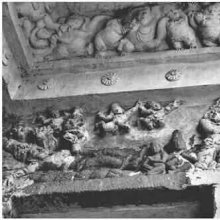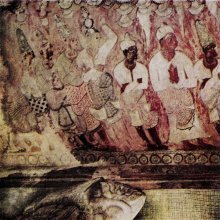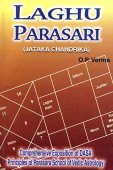Par, Pār: 9 definitions
Introduction:
Par means something in Hinduism, Sanskrit, the history of ancient India, Hindi, Tamil. If you want to know the exact meaning, history, etymology or English translation of this term then check out the descriptions on this page. Add your comment or reference to a book if you want to contribute to this summary article.
Images (photo gallery)
India history and geography
Source: academia.edu: Minor Chiefs and "Hero" in Ancient TamilakamPār (“earth”) is a name related to the historical geography and rulers of ancient Tamil Nadu, occuring in Sangam literature such as the Akanāṉūṟu and the Puṟanāṉūṟu.—Notes: (VIS 447), poḻil (Puṟam. 256, 362, VIS 494, cf. Rajarajan 2016a: 85-86).

The history of India traces the identification of countries, villages, towns and other regions of India, as well as mythology, zoology, royal dynasties, rulers, tribes, local festivities and traditions and regional languages. Ancient India enjoyed religious freedom and encourages the path of Dharma, a concept common to Buddhism, Hinduism, and Jainism.
Languages of India and abroad
Sanskrit dictionary
Source: DDSA: The practical Sanskrit-English dictionaryPār (पार्).—1 P.
1) To complete, finish.
2) To cross over.
3) To be able, competent.
4) To win; समरं पारयिष्यति (samaraṃ pārayiṣyati) Śiva B.24.4.
Source: Cologne Digital Sanskrit Dictionaries: Shabda-Sagara Sanskrit-English DictionaryPār (पार्).—[pāra] r. 10th cl. (pārayati-te) To accomplish, to finish, to get through or over. ada0 cu0 ubha0 saka0 seṭ .
Source: Cologne Digital Sanskrit Dictionaries: Benfey Sanskrit-English DictionaryPār (पार्).—i. 10, see 1. pṛ, [Causal.]
[Sanskrit to German]
Sanskrit, also spelled संस्कृतम् (saṃskṛtam), is an ancient language of India commonly seen as the grandmother of the Indo-European language family (even English!). Closely allied with Prakrit and Pali, Sanskrit is more exhaustive in both grammar and terms and has the most extensive collection of literature in the world, greatly surpassing its sister-languages Greek and Latin.
Hindi dictionary
Source: DDSA: A practical Hindi-English dictionaryPar in Hindi refers in English to:—(ind) but; yet; even so, even then; on; at; after; (a) opposite, inimical; other; alien; higher; (nm) a wing; feather; plume; ~[kata] wing-clipped; ~[kaja] other’s job, other’s interest; ~[kaji] serving others' interest; benevolent/benignant; ~[kaya] another’s body/person; •[pravesha] entering into another’s body through yoga; ~[kriti] another’s performance/deed; ~[kramya] negotiable; ~[jana] belonging to others; not cur own (people); ~[jati] another caste, not our own caste; ~[tamtra] see [paratamtra; ~tamtrata] see [paratamtrata; ~dara] another man’s wife; ~[drohi/dveshi] cynical, jealous of or hostile to all others; ~[dhana] another’s wealth; ~[dharma] another’s religion; ~[nama] allonym; ~[nirbharata] dependence; ~[paksha] the other side; the opponent’s case/argumentation; -[para] the other bank/coast, across; ~[pidaka] a sadist, causing harassment/affliction to others; ~[purusha] other person, a man other than a woman’s husband; stranger; ~[basa] dependent on others; under other’s control/sway; ~[bhasha] another language; ~[bhrita] nursed and brought up by another; a cuckoo; ~[rati] alloeroticism; ~[lekha] allograph; ~[vasha] see [paravasha; ~vashata] see [paravashata; ~vada] a rumour; slander; ~[vadi] a rumour-monger; slanderer; ~[sala] last year; next year; ~[sukhavada] altruism, altruistic hedonism; ~[sukhavadi] altruistic; ~[stri] another man’s wife; ~[sva] another’s property/money/due; •[harana] anusurpation, depriving somebody of his due/property/money; ~[hita] other’s interest/good; —[ana/ugana] see —[nikalana; —kata jana] to be rendered ineffective/inefficacious, to be incapacitated; —[katarana] see —[kaimca karana; —kata dena] to render ineffective/inefficacious; to incapacitate; —[kaimca karana] to clip the wings; to render ineffective/inefficacious/inactive; —[jamana] to grow wings; (fig.) to manifest one’s mischievous self, to take to mischief; —[nikalana/lagana] to ride for a fall, to grow wings; to take to mischievous deeds; —[phadaphadana] to make a desperate effort (to get free or to achieve any other objective); —[bamdha dena] to render helpless/inactive,.—par (पर) is alternatively transliterated as Para.
...
Kannada-English dictionary
Source: Alar: Kannada-English corpusPār (ಪಾರ್):—
1) [verb] to see; to look at.
2) [verb] to expect; to look forward to; to anticipate.
3) [verb] to wish for.
4) [verb] to think deeply about; to consider carefully; to ponder over.
5) [verb] to notice or perceive; to pay special attention to; to observe.
--- OR ---
Pār (ಪಾರ್):—
1) [verb] to spring, jump up.
2) [verb] to rise or fly high into the air; to soar.
3) [verb] to move or glide on currents of air.
4) [verb] to go away; to depart.
5) [verb] (a group of people, mob) to break up and move in different directions; to scatter; to disperse.
6) [verb] to throb, palpitate rapidly.
7) [verb] to be destroyed; to be demolished.
8) [verb] to send out; to discharge; to emit.
Kannada is a Dravidian language (as opposed to the Indo-European language family) mainly spoken in the southwestern region of India.
Tamil dictionary
Source: DDSA: University of Madras: Tamil LexiconPār (பார்) [pārttal] 11 transitive verb [K. pāru, M. pārkka.]
1. To see, look at, view, notice, observe; கண்ணால்நோக்குதல். பாராக்குறழா [kannalnokkuthal. parakkurazha] (கலித்தொகை [kalithogai] 65).
2. To examine, inspect, search into, scrutinise; ஆராய்தல். படுபயனும் பார்த்துச் செயல் [araythal. padupayanum parthus seyal] (திருக்குறள் [thirukkural], 676).
3. To know; அறிதல். காலம்பார்த் துள்வேர்ப்ப ரொள்ளியவர் [arithal. kalambarth thulverppa rolliyavar] (திருக்குறள் [thirukkural], 487).
4. To look for, expect; எதிர்பார்த்தல். வருவிருந்து பார்த்திருப்பல்லாண்டு பான் [ethirparthal. varuvirunthu parthirup pan] (திருக்குறள் [thirukkural], 86).
5. To desire, long for; விரும்பு தல். புதுமை பார்ப்பார் [virumbu thal. puthumai parppar] (கம்பராமாயணம் பூக்கொய். [kambaramayanam pukkoy.] 9).
6. To search for, seek; தேடுதல். ஆட்பார்த் துழலு மருளில் கூற்று [theduthal. adparth thuzhalu marulil kurru] (நாலடியார் [naladiyar], 20).
7. To worship; வணங்குதல். (சூடாமணிநிகண்டு) [vananguthal. (sudamaninigandu)]
8. To estimate, value; மதித்தல். அவன் வயிரம் பார்ப்பதில் கெட்டிக்காரன். [mathithal. avan vayiram parppathil kettikkaran.] Colloq.
9. To heed, pay attention to; கவனித்தல். [kavanithal.]
10. To look after, take care of, manage, superintend; மேற்பார்த்தல். பண்ணை பார்க்கிறான். [merparthal. pannai parkkiran.]
11. To peruse, look through, revise; பார்வையிடு தல். இந்தப் பத்திரத்தைப் பாருங்கள். [parvaiyidu thal. inthap pathirathaip parungal.]
12. To treat, administer medicine; மருந்து முதலியன கொடுத்தல். யார் வைத்தியம் பார்த்துக் கொண்டிருக் கிறார். [marunthu muthaliyana koduthal. yar vaithiyam parthug kondirug kirar.]
13. To charm away by incantations, exorcise; மந்திரித்தல். இந்த விஷக்கடிக்கு மாந்திரி கன் பார்க்கவேணும். [manthirithal. intha vishakkadikku manthiri kan parkkavenum.]
14. To intend, design, attempt, purpose, aim at; கருதுதல். [karuthuthal.]
15. To look at with compassion; கடைக்கணித்தல். பார்த் தொருகா லென்கவலை தீராயோ [kadaikkanithal. parth thoruga lenkavalai thirayo] (தாயுமானசுவாமிகள் பாடல் பராபர. [thayumanasuvamigal padal parapara.] 663).
--- OR ---
Pār (பார்) noun < பர-. [para-.]
1. Expanse; பரப்பு. தேர்ப்பார். (சூடாமணிநிகண்டு) [parappu. therppar. (sudamaninigandu)]
2. Central platform of a chariot; தேர்ப்பரப்பு. (பிங்கலகண்டு) [therpparappu. (pingalagandu)]
3. Long bar of the body of a cart; வண்டியினடிப்பாகத்துள்ள நெடுஞ் சட்டம். கால்பார் கோத்து [vandiyinadippagathulla nedugn sattam. kalpar kothu] (புறநானூறு [purananuru] 185).
4. Earth; பூமி. பார்தோன்ற நின்ற பகையை [pumi. parthonra ninra pagaiyai] (சீவகசிந்தாமணி [sivagasindamani] 1931).
5. Earth, as an element; பிருதிவி யென்னும் பூதம். பாரிடை யைந்தாய்ப் பரந்தாய் [piruthivi yennum putham. paridai yainthayp paranthay] (திருவாசகம் [thiruvasagam] 4, 137).
6. Land, country; தேசம். தஞ்சென வொதுங்கினோர் தனது பாருளோர் [thesam. thanchena vothunginor thanathu parulor] (கம்பராமாயணம் பள்ளி. [kambaramayanam palli.] 108).
7. Hard ground; வன்னிலம். பாருடைத்த குண்டகழி [vannilam. parudaitha kundagazhi] (புறநானூறு [purananuru] 14).
8. Rock, rocky stratum, shelf of rock; பாறை. பார்முதிர் பனிக்கடல் [parai. parmuthir panikkadal] (பத்துப்பாட்டு [pathuppattu] 45).
9. Bank, border, ridge; வரம்பு. [varambu.] (W.)
10. Pearl bank; முத்துவிளையுந் திட்டு. [muthuvilaiyun thittu.] Local usage
11. Group of parterres; பாத்தி பல கொண்ட பகுதி. இந்தப் பாரைச்சேர்ந்த கீரைப்பாத்தி. [pathi pala konda paguthi. inthap paraicherntha kiraippathi.] Local usage
12. Stratum, layer, bed; அடுக்கு. [adukku.] (W.)
13. Obstruction, obstacle; தடை. கலை பாரறச்சென்ற கேள்விக்கோ [thadai. kalai pararachenra kelvikko] (சீவகசிந்தாமணி [sivagasindamani] 30).
14. The fourth nakṣatra. See உரோகிணி. (திவா.) [urogini. (thiva.)]
--- OR ---
Pār (பார்) noun < பரு-மை. [paru-mai.] Bulk, size; பருமை. [parumai.] (சீவகசிந்தாமணி [sivagasindamani] 224.)
--- OR ---
Pār (பார்) noun < பார்ப்பான். (அகராதி நிகண்டு) [parppan. (agarathi nigandu)]
1. [Telugu: pāruḍu.] Brahman; மறையோன். [maraiyon.]
2. Buddha; புத்தன். [puthan.]
--- OR ---
Pār (பார்) noun cf. மாறு. [maru.] Turn, time; தடவை. ஒருபார் வந்து விட்டுப்போ. [thadavai. orupar vanthu vittuppo.] (J.)
Tamil is an ancient language of India from the Dravidian family spoken by roughly 250 million people mainly in southern India and Sri Lanka.
See also (Relevant definitions)
Starts with (+9980): Bartarph, Par puranti, Par-arsi, Par-corripalai, Par-kattucuram, Par-khaw-dur, Par-khawdur, Par-kittunoy, Par-micainatanton, Par-punku, Para, Para balsam, Para cress, Para nut, Para rubber, Para Sutta, Para-Bindu, Para-camayakolari, Para-kayacaritar, Para-kayapiravecam.
Ends with (+216): Akapar, Ampar, Annantupar, Anpar, Antaratarpar, Antartarpar, Apar, Appar, Aprampar, April-par, Arai-kuraipar, Arappar, Arpar, Atipar, Ban faapar, Ban-phappar, Bawngpu-pangpar, Bethlehempar, Calophyllum dispar, Campar.
Full-text (+1113): Avayavadharma, Yugalay, Goshadgava, Mushtidyuta, Goyuga, Parccattam, Yugalaka, Dvanda, Vanpar, Ven-parkal, Par-micainatanton, Parilavu, Parkkol, Paraya, Parpputtel, Parmakal, Pariluvai, Dvipatra, Cukkampar, Paritam.
Relevant text
Search found 188 books and stories containing Par, Pār, Paar; (plurals include: Pars, Pārs, Paars). You can also click to the full overview containing English textual excerpts. Below are direct links for the most relevant articles:
Tiruvaymoli (Thiruvaimozhi): English translation (by S. Satyamurthi Ayyangar)
Pasuram 7.9.5 < [Section 9 - Ninth Tiruvaymoli (Enraikkum)]
Pasuram 5.4.1 < [Section 4 - Fourth Tiruvaymoli (Ur ellam tunci)]
Pasuram 7.9.8 < [Section 9 - Ninth Tiruvaymoli (Enraikkum)]
Satapatha-brahmana (by Julius Eggeling)
Additions and Corrections to volume 5 (kāṇḍa 11-14) < [Additions and Corrections]
Additions and Corrections to volume 1 (kāṇḍa 1-2) < [Additions and Corrections]
Kāṇḍa I, adhyāya 9, brāhmaṇa 1 < [First Kāṇḍa]
The Bhikkhus Rules (by Bhikkhu Ariyesako)
Robbery By False Pretences < [Chapter 4 - Right Livelihood For A Bhikkhu]
Murder < [Chapter 1 - Harmlessness]
Chapter XII - The Nature Of Mountains
Chapter XX - The Nature Of Rivers
Later Chola Temples (by S. R. Balasubrahmanyam)
Temples in Nagar < [Chapter X - Temples of Rajadhjraja II’s Time]
Chapter VII - Rajaraja II (a.d. 1146 to 1172)
Temples in Magaral < [Chapter VI - Temples of Kulottunga II’s Time]
Vinaya (1): The Patimokkha (by T. W. Rhys Davids)
Related products



